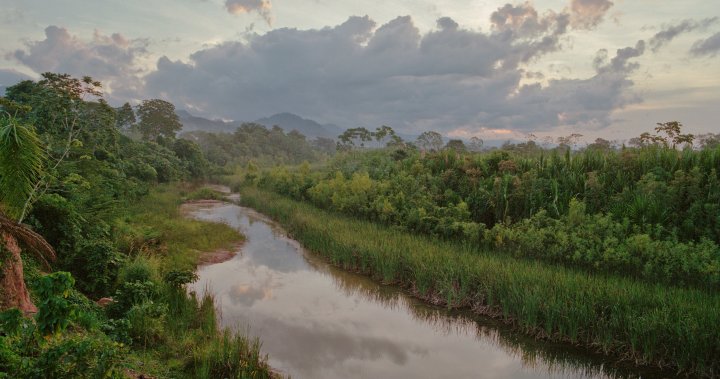Alberta wildfire experts in Bolivia to help with fire training, prevention | Globalnews.ca
On her first trip to Bolivia in January, Jane Park hiked about 20 kilometres with national park rangers to a steep, remote area with endangered palm trees and the Andean, or spectacled, bear.
Much of the area in ANMI-El Palmar, one of the country’s protected areas, had been burned in a wildfire.
“A lot of areas where they are fighting fires are extremely remote,” Park said in a recent interview from Banff, Alta.
Read more:
62% of Alberta wildfires were caused by humans in 2021
Park, who’s on an unpaid leave from her regular job as a fire and vegetation specialist in Banff National Park, is one of two Alberta experts spending some of their off-season helping the Bolivian government prepare for an increase in fires due to climate change.
It’s part of Global Affairs Canada’s technical assistance partnership, which allows Canadians from different backgrounds to share their expertise in other countries.
Park came across the opportunity online and got the contract, which started with the trip to Bolivia in January to tour five of the country’s protected areas.

The trek to El Palmar, an integrated management natural area, was the same route park rangers took when the fire started.
“It’s incredible,” said Park. “They walk enormous distances. They are local people, they are used to high elevation and they are extremely fit.
“But if you imagine that even the fittest rangers take several hours to walk into a fire, the amount of fire growth that would occur during that time and then the challenges that come with fighting it without aircraft or without decent sources of water, it’s all the more challenging.”
Read more:
First Nations students get hands-on wildfire training
Park added that the rangers carry portable water bladder packs and use machetes to fight the fires.
“In Canada, we have easy access to aircraft and water,” she said. “So, there are definitely some interesting and very challenging conditions that folks have to work with down there.
“We have to make sure we’re tailoring what we’re training to their reality.”
Park, who returned to Bolivia this week, said she’s helping the environmental departments improve their management practices and build capacity to respond to those fires.
“That’s everything from prevention, suppression, wildfire management, communication, monitoring.”
Bolivia’s protected areas have high biodiversity, but wildfires — due to drought and longer fire seasons caused by climate change — have threatened them.
Global Forest Watch says the country lost 1.6 million hectares of tree cover in fires from 2001 to 2021. Some studies have shown those wildfires are one of the greatest threats to endangered and threatened bird species.
As the fires get longer, larger and more frequent, Park said more agencies are helping the park service — whether that’s community volunteers, fire brigades or the military.
“The park rangers, because they are the most experienced, end up having to lead these people that are maybe less experienced,” said Park. “They lack additional training in how to lead resources and lead people who may not have the same level of experience as them.”
Read more:
Lone Newfoundlander spends Christmas in Australia helping fight wildfires
As Park helps to train those rangers, another Alberta expert is working with the Bolivian military.
Mike May, a senior wildfire specialist, said the military formed a task force that includes members from the army, navy and air force to respond to emergencies in areas such as the Bolivian Amazon.
May, who signed his contract as a “side hustle” in addition to his regular job, also visited Bolivia for a week in January to do a needs analysis and is to return this month to provide the training.
“There’s not a lot of funding available for them,” he said in an interview from Hinton, Alta. “They have some tools — maybe not to the extent that we in Canada do. We are quite fortunate up here.”

May, who has previously provided his expertise in South Africa and Australia, said he is to train a group of military personnel are to then train the front-line soldiers to help fight the fires.
“`The hope is… to start them on the right path so that they are able to build their wildfire program within the military,” he said.
May said he and Park recognized a need for some cross-agency training, which they will also provide.
“It’s always unique and fascinating to be able to go to different agencies and jurisdictions to see how they manage wildfires,” said May. “I have no doubt I will be able to take home some good lessons from Bolivia.”
He said he feels fortunate to get the opportunity and offer of his some expertise.
“We’re Canadians,” added May, “and we just want to help people.”
© 2023 The Canadian Press
For all the latest world News Click Here





